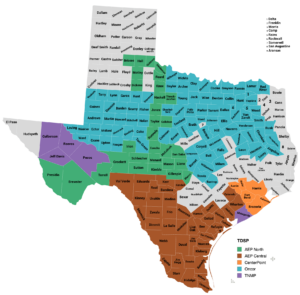Businesses in Texas have the power to choose their own electric rate and provider, allowing them to possibly find lower rates and more suitable plans for their business.
The current average commercial electricity rate in Texas is 6.80 ¢/kWh, with plans available for as low as 6.02 ¢/kWh.
Below are featured fixed-rate plans for businesses in Texas. These include rates in the Oncor, CenterPoint, AEP Texas, and TNMP service areas.
| Provider ⇅ | Contract Length ⇅ | Rate (¢/kWh) ⇅ |
|---|---|---|
| NRG | 6 months | 6.02 ¢/kWh |
| Gexa Energy | 6 months | 6.24 ¢/kWh |
| Hudson Energy | 6 months | 6.50 ¢/kWh |
| Pulse Power | 18 months | 6.57 ¢/kWh |
| Direct Energy | 6 months | 6.57 ¢/kWh |
| AP GAS & ELECTRIC (TX) LLC | 6 months | 6.59 ¢/kWh |
| Pulse Power | 30 months | 6.75 ¢/kWh |
| NRG | 18 months | 6.78 ¢/kWh |
| Pulse Power | 12 months | 6.78 ¢/kWh |
| Freepoint Energy Solutions | 6 months | 6.78 ¢/kWh |
| Pulse Power | 36 months | 6.82 ¢/kWh |
| Pulse Power | 24 months | 6.82 ¢/kWh |
| NRG | 30 months | 6.89 ¢/kWh |
| NRG | 12 months | 6.92 ¢/kWh |
| NRG | 60 months | 6.95 ¢/kWh |
| NRG | 24 months | 6.95 ¢/kWh |
| NRG | 36 months | 6.97 ¢/kWh |
| NRG | 48 months | 6.98 ¢/kWh |
| AP GAS & ELECTRIC (TX) LLC | 18 months | 7.00 ¢/kWh |
| IronHorse Power Services | 6 months | 7.06 ¢/kWh |
| Hudson Energy | 18 months | 7.10 ¢/kWh |
| AP GAS & ELECTRIC (TX) LLC | 12 months | 7.12 ¢/kWh |
| Gexa Energy | 18 months | 7.18 ¢/kWh |
Rates are subject to change daily and vary by location. Enter your zip code for the most accurate, up-to-date pricing.
Custom Business Rates
The rates above are for small to medium-sized businesses. If your company spends over $1,000 per month on electricity, you may qualify for custom pricing.
How to Shop for Business Electricity in Texas
- Enter your zip code: Enter your zip code and answer a few questions — we need your service address to filter out providers that don’t serve your building(s).There’s no spam and your information is shared with anyone (unless you decide to sign up with an individual provider).
- Compare Providers and Plans: We use the data you submit to instantly show you fixed-rate plans from dozens (depending on your location) Retail Electric Providers (REPs).Pay attention to the rate (¢/kWh) and the contract length.
- Lock In Your Rate: Once you choose a plan, you can then select your desired sign up date right on our website. The new provider will handle the switch with your local utility (TDU). There is no interruption to your service.If you need help with anything along the way, we’re here for you.
Understanding the Texas Electricity Market
In Texas, the energy market is split between two types of companies and entities:
- Retail Electric Providers (REPs): These are the companies you shop with and compare on our site — Reliant, TXU Energy, Gexa, and many more. They buy electricity on the wholesale market and sell it to you.They manage your account, set your rate, and handle your billing.
- Transmission and Distribution Utilities (TDUs): These are your local utility companies, like Oncor (Dallas-Fort Worth), CenterPoint (Houston), AEP Texas, and TNMP. They own and operate the poles, wires, and meters. You cannot choose your TDU.
Frequently Asked Questions for Texas Businesses
Your Transmission and Distribution Utility (TDU), such as Oncor or CenterPoint, manages the poles and wires that deliver electricity. They are responsible for outages. Your Retail Electric Provider (REP) is the company you buy the electricity from, like Reliant or TXU. The REP sets your rate and handles your billing.
Your Electric Service Identifier (ESI ID) is a unique 17-digit number for your service location in Texas. You can find it on any previous electricity bill. It’s the most important number needed to get an accurate quote.
Demand charges are based on your business’s peak electricity usage during a billing cycle, measured in kilowatts (kW). Your TDU charges this fee to ensure the ERCOT grid can meet your maximum power needs, especially during hot Texas summers.
Possibly. Texas businesses primarily engaged in manufacturing or processing may qualify for a sales tax exemption on their electricity. This requires a Predominant Use Study to verify that over 50% of your electricity consumption is used in tax-exempt activities.
Texas Commercial Electricity

Texas operates one of the largest deregulated electricity markets in the United States where businesses in certain areas can choose their Retail Electricity Provider (REP). Roughly 85% of the state’s population resides in a deregulated area equating to roughly 26 million people.
- Deregulated Market: Approximately 2.52 million businesses in Texas, or 85% of total businesses in Texas, operate in deregulated areas, allowing them to shop for electricity rates
- Competitive Pricing: Texas business electricity rates typically range from 8 to 12 cents per kWh. Lower rates are available with custom pricing and for larger commercial & industrial businesses.
- Deregulated Cities/Areas: Major business centers like Houston (CenterPoint Energy), Dallas-Fort Worth (Oncor), and Corpus Christi (AEP Texas) help make up 85% of the deregulated electricity market.
- Regulated Cities/Areas About 15% of businesses, located in areas like Austin (Austin Energy), San Antonio (CPS Energy), and El Paso, are served by regulated utilities without REP options.
- Market Oversight: The Public Utility Commission of Texas (PUCT) regulates the deregulated market and helps educate and protect businesses
